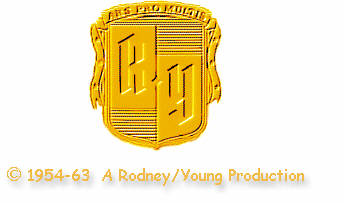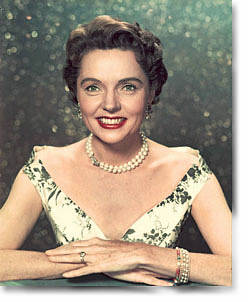Jane Wyatt Tribute
Condensed article from the Washington Post (2006)
Jane Wyatt personified “the mom of all moms” to us in the 50s because watching her run her home from our homes week after week engendered feelings of closeness, intimacy and maybe even a sort of vicarious dependency.
Television was awash with moms in the ’50s, when the domestic sitcom flowered, but Jane Wyatt as Margaret Anderson on “Father Knows Best” transcended the usual generic genetics. She had too much character to be “Anymom” but enough authority to be “Everymom”. She was pretty in a radiantly wholesome way.
“Father Knows Best” was playing on radio, but with a different actress as Margaret. Wyatt never listened to it, but when presented with the pilot script for a TV version, she found it “enchanting.” The part was hers, opposite Robert Young as her insurance-selling husband, Jim.
The first episode was filmed at Columbia Pictures, the same studio where, decades earlier, Wyatt played the object of Ronald Colman’s starry-eyed lust in Frank Capra’s “Lost Horizon.” In “Father Knows Best.” Jim and Margaret Anderson slept in separate beds, the family’s bathroom lacked a toilet, and nobody made even vaguely off-color remarks. The Andersons were in many ways a typically counterfeit, homogenized, vanilla-pudding version of the American family. Even so, the show operated on a higher plane than similar sitcoms, partly because Young told producing partner Eugene Rodney that he wanted a father on the show who was “not a boob.”
If Young, as co-producer, dominated many of the scenes and gave Jim Anderson more dialogue, Wyatt made the most of whatever golden opportunities arose. None was more suitably lustrous than her shining hour, “A Medal for Margaret,” which won an Emmy for director Peter Tewksbury in 1959. According to the storyline, Margaret feels trivialized by being relegated to housework — the mending of jeans, the washing of dishes — while other family members romp through outside activities, sometimes winning trophies and citations.
She decides that she’ll have an outside activity, too, and with the help of a congenial codger who’s an expert on fly-fishing, learns the sport — practicing rigorously for weeks on end. The day of the big competition is coming up, and Margaret has a good chance of winning. But while doing some family errand, she falls and breaks her arm, dashing her chances of competing in the tournament.
Members of the family rally while Margaret sulks in her bedroom and, in the last third of the show, put on their own version of “This Is Your Life,” the then-popular reality show (of a sort) on which each week a celebrated figure was surprised by host and producer Ralph Edwards with a half-hour biography, told through the words of old friends and relatives who came out from behind curtains to hug and kiss the honoree.
Each family member recites some priceless act of maternal kindness that Margaret had selflessly performed on their behalf — saving the day so many times that the days could never be counted. It was an irresistibly sweet and tearjerking half-hour, and it epitomized the warmth that made “Father Knows Best” a classic.
Perhaps the moral of that tale, that mothers are underappreciated, hardly qualifies it as a statement on behalf of womanhood, but one has to consider the context of the times. Wyatt’s Margaret was a woman of dignity and a more intelligent independence than other TV moms.
Wyatt said she was frustrated with the show in its first season but would be told to wait until the second year, when scripts would give her more to do. “Still, I got frustrated at times. I was never shown reading a book. On the other hand, what kind of a show would we have had if Mom was off having a career? I think for the time, it was okay.”
Wyatt, in every episode, was more than okay. She was a heavenly mom, who, although she might have had her little human failings, seemed for the most part perfect — not so sweet as to be unbelievable, but clearly an improvement on reality, the way most TV shows and movies used to be.
For many little girls of the ’50s, Jane Wyatt as Margaret Anderson was the mother they hoped they’d be when they grew up. By the time they did, the world had changed in so many ways that Margaret was largely an irrelevancy. But in her day, and with an assurance that goes beyond mere professionalism, Jane Wyatt beautifully and memorably made believers of us all.
Jane Wyatt passed away of natural causes on October 20, 2006 at the age of 96.


